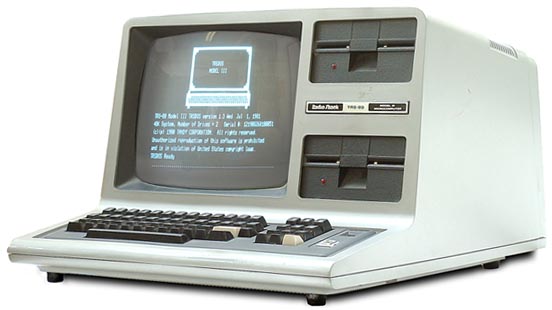I run a computer on Win7 at work, because it needs some important legacy software. It can’t be containered because it has a nasty licence manager.
And my oscilloscope runs on Win98.
I would still be using Windows 7 if it was safe to connect to the internet.
I can’t believe government systems are just open to cyber security like that.
Are there not cyber terrorists for some teenager that has tried to do anything with these unsecured systems?
I’d still be using Windows 7 if I could.
I mean, you can if you want to
It’s not safe and all that stuff.
MS DOS 6.6 for me - I enjoy the power of a 286 processor and much smaller instruction sets.
:O
I know it’s not exactly the point of the article but for a lot of things, I reckon a good amount of ‘innovation’ was pretty pointless. I personally don’t think I ever needed anything that Office 2003 can’t do… (Of course I don’t use any MS office to begin with but you get the point)
Everything beyond the Dewey decimal system is/was pretty unnecessary, imo. We created a way to organize and “quickly” locate information stored in a physical format.
The near complete lack of manual labor has had many long reaching effects on society.
I type this on my brand new flagship phone…
I’ve been trying tk get family to switch to Linux, but some are irrationally attached to MS Word. I wonder if Office 2003 will run in Wine?
I’ve had success with Office 2010 under Wine.
https://appdb.winehq.org/objectManager.php?sClass=version&iId=18487
I’ve heard LibreOffice has settings that make it look like Word
=Let(), Lambda and Regex were good additions to Excel imo
The elevator was running Windows XP.
Clearly a extreme case of overengineering. A elevator has no business running more than a few microcontrollers.
It’s probably only the screen component that is running an old version of embedded windows.
Screen? In a elevator?
How else are you gonna show ads?
I hate that you are right.
Yes? That is not that unusual and it is mentioned in the third sentence of the article.
As I rode up to the 14th floor, my eyes were drawn to a screen built into the side of the lift.
Those screens can easily run on an integrated Raspberry Pi microcontroller, they dont exactly have complex graphics
We are far away from the release of the Raspberry Pi if that screen is running an early version of Windows CE. Putting a PC in the elevator to drive the screen was probably the most cost effective solution.
Was but theres no reason to keep doing that
There’s not particularly good reason to stop doing it in that scenario either.
You have an offline technology stack in that elevator that has been doing the job correctly for 20 years. Why take on the expense and risk of changing things that aren’t currently broken?
It would be crazy if you are building new to resort to that stack, but for an established elevator, why bother?
Same for some old oscilloscopes at work. I’m not crazy about the choice but I can hardly suggest it would be practical to change it while the oscilloscopes still do their function.
I would say it’s a problem if the stack is online, but if it is self contained, the age of the software doesn’t make it a problem in and out itself.
New ones probably use something newer. The 20 year old elevator in a hospital will only be upgraded if something breaks.
Qube cinema servers only got off XP in 2015. They’re still on 7 though.
there’s a word for those people: awesome
windows xp was peak; running anything before xp is legendary
I ran Linux 1994ish. Amiga OS before. Amstrad CPC 464 before. A friend ran Sinclair ZX-80, that was the first system I had access to.
aside from radio shack and texas instruments that i used at camp, i think i was sadly too young to do anything but windows 3.1 :( our first computer was a tandy sensation in the early 90s and i didn’t really play with linux until maybe the mid 2000s
except for playing with apple IIe and radio shack computers through school and camp, that is.
TRS-80 and TI 99/4A presumably?
i’m pretttyyyyy sure this one is the one we had at camp :)

“stuck” more like happy to not have to deal with the last 15-ish years of microsoft ruining everything they previously excelled at.
They lost me when they removed the start button on the left side of the taskbar in version 8.1 (I think it was) to… Be cool with the kids (I think 8.1 was supposed to be touch screen friendly)? I don’t even know, but I went back to Windows 7 for a long while.
The backlash with the start button was so huge that they put it back on the taskbar in Windows 10 (at least mine has it and is the reason I got Windows 10). I’m currently refusing to update to Windows 11, because it apparently crashes when playing certain video games and I’m not about to have the other trash bugs that come with it, which I’ve been seeing posted on Microsoft help forums when I search for Windows 10 related questions. Fuck that noise, I don’t want to deal with it.
They seemingly wanted to design the entire interface around touchscreen 2-in-1s. If you went in a Microsoft store around the time windows 8 came out, they were leaning really hard into the 2-in-1s. I got a surface pro 3 at that time that I used to take handwritten notes in school, and the windows 8 interface was honestly awesome with that use case. On my desktop PC, though, I held out updating from 7 until windows 10.
Windows 8 removed the start button, 8.1 brought back most all of the “legacy” UI features (which still persist today).
It might be. I remember buying a laptop at that time and it came with 8 and it annoyed me so dang much.
I have had better luck with game compatibility using proton on linux than I had with win 11
Never thought I’d miss Ballmer, but here we are.
Yeah. Its a gross feeling isn’t it?
I had a 486DX running DOS for writing and editing CAM programs for CNC mills, lathes, pipe bender, and a laser cutter. And for funsies, an even older Macintosh that booted from a 5 1/4" floppy that ran a CMM, (co-ordinate measuring machine). And the software for the CMM ran from another 5 1/4" floppy.
This was about 2017 before I retired as a toolmaker.
Why not? Still using Windows 7 on one of my ThinkPads. It’s a solid system, if you know what you’re doing and how to use is safely.
and how to use is safely.
Such as by disconnecting the ethernet and power cables
I wouldn’t be surprised if there are a bumper crop of level 10 CVEs in the latest and “greatest” version of Windows 7 that will never get patched. Unless you have one of those special enterprise licenses that they keep updating.
I like the little typo … c:// :)
I’m visiting my parents in my home country after many years of not being there. I’m hoping my dad’s old pentium 2 laptop is still around.
I’m disturbed that an elevator is running a desktop OS. How did this happen? Did they never hear of microcontrollers?
I could tell you the stories of W95 & XP that runs the medical world…
Frighteningly, i worked as an admin at a hospitality wifi business that ran a windows box for dhcp duty. I would have to go o site, in the middle of the night, down to the basement of this hotel, and reboot the damn thing. It would die almost every week. Replaced with a linux server and never heard from them again.
At my old workplace, there was numerous XP machines still going. They were running old machine equipment, and basically served as a controller for the entire machine.
As it turns out, it was cheaper to keep these XP stations, instead of buying a completely new Hydrolic press, or whatever it was running, which cost several hundred of thousands of dollars.
One day one of these computers stopped working, and we immediately tried to get the software to work on a brand new W10 replacement. Took us a week of drivers hell, until we eventually went to the basement, found an exact replica, and swapped the HDD over.
The company, making these heavy machineries, went bankrupt in the early 2000s, and there was literally no way of getting the software to run on anything besides that original box.
I’d like a law that software / hardware companies who file for bankruptcies must release the source / files for their tech to an open source repository.
I like that idea bit it’ll never fly. That software is an asset. A bankrupt company needs every asset to be sold to cover as much percentage of their debt to their vendors as possible. I’ve been in a company that went bankrupt and I’ve been the vendor of a company that went bankrupt. Being the vendor was the harder experience.
I’m sure it makes the bean counters happier to have another asset valued at X amount, but in practice the software will just be locked in some vault where it won’t do anyone any good.
Its an instance where the number on the screen doesn’t actually correspond to any useful economic activity.
If you are a big company there are often ESCROW agreements for things like this. I have encountered the “data dumps” from time to time and whilst it’s “better” it’s not ideal. Half finished documentarian, virtual machines of mis-configured OS installs… it’s almost as if it was just a straight copy of the development environment as it was just as they made the final version of the software…
But it’s better than nothing.
Main issue I can see with this forcing open source would be libraries and frameworks licensed from others who would likely still be in business and wouldn’t agree to those parts becoming open sourced. See also WinAMP https://www.theregister.com/2024/10/16/opensourcing_of_winamp_goes_badly/
Yup. Take backups, have spares, and keep it off the Internet and it’ll work just fine.
Pro tip, you can get IDE to CF adapters if you want to put an SSD in those old machines to really see them fly. Just be aware that they don’t have nearly as good write durability as a real SSD, so keep write heavy operations on the HDD.
You can get industrial grade CF cards that use SLC memory. They have much better write endurance than normal CF cards.
There’s still things like that on my workplace today. I think there’s some older, rarely used CNC with Win98 on the controller. We just keep spares around when they break, but that’s cheaper than replacing the whole machinery. Also there’s some XP stations running software for an industrial machine which would cost quarter of a million to replace. Some of those need access to network drives and such but they live in a strictly isolated VLAN.
And, as far as I’ve told at least, there was no option at any point to upgrade just the computers on those things. It’s always the whole assembly line or whatever they’re connected to. There’s not many companies willing to throw hundreds of thousands every 3-5 years to replace perfectly working equipment.
It’s funny, because this scenario actually happened in our CNC hall.
The guys over there were working with SolidWorks and Mastercam. I never really got too involved with their work, other than installing the software remotely for them.
It could very well have been a CNC machine that this procedure was about. I just know that they had all kinds of equipment in there, along with a hydrolic press, which peaked my interest the most because of a certain Finnish youtuber haha.
there’s some older, rarely used CNC
Me over here with a dirty mind 100% positive that I’m not using “CNC” the same way you are. I don’t know what your way means, but my way is more fun.
CNC—computer numerical control, where a computer makes the cutty/smushy/printy parts move through meatspace.
CNC—computer numerical control, where a computer makes the cutty/smushy/printy parts move through meatspace.
There are third parties that create new software for old industrial machines for this exact reason.
“Stuck”
Imagine being stuck using something that works for 30 years.
Right? If it still works then it still works.
If the article was talking about anything other than tech/software, we’d be praising its longevity.
I mean, you could read the article. Many users are unhappy with the performance or reliability.
And a lot of people are actually stuck because the Windows XP/7 machine is attached to industrial equipment that costs an unbelievable amount of money or is just impossible to replace.
It really depends what its used for.
Anything that is public facing would never work without constant maintenance and upgrades, be it a computer OS or some complex piece of hardware.
Yup, also especially for industrial applications, requirements and needs absolutely can change, and that means having to work around the equipment. I have seen firsthand the experience of trying to get new features into ancient applications. (Made worse by the fact that we took on support for it because the original company which had created the program had gone under).
And now you got a virus and it doesn’t work anymore.
You can protect yourself from that with airgapping and backups. The bigger issue is probably that it’s becoming increasingly hard to source parts for such old hardware.















